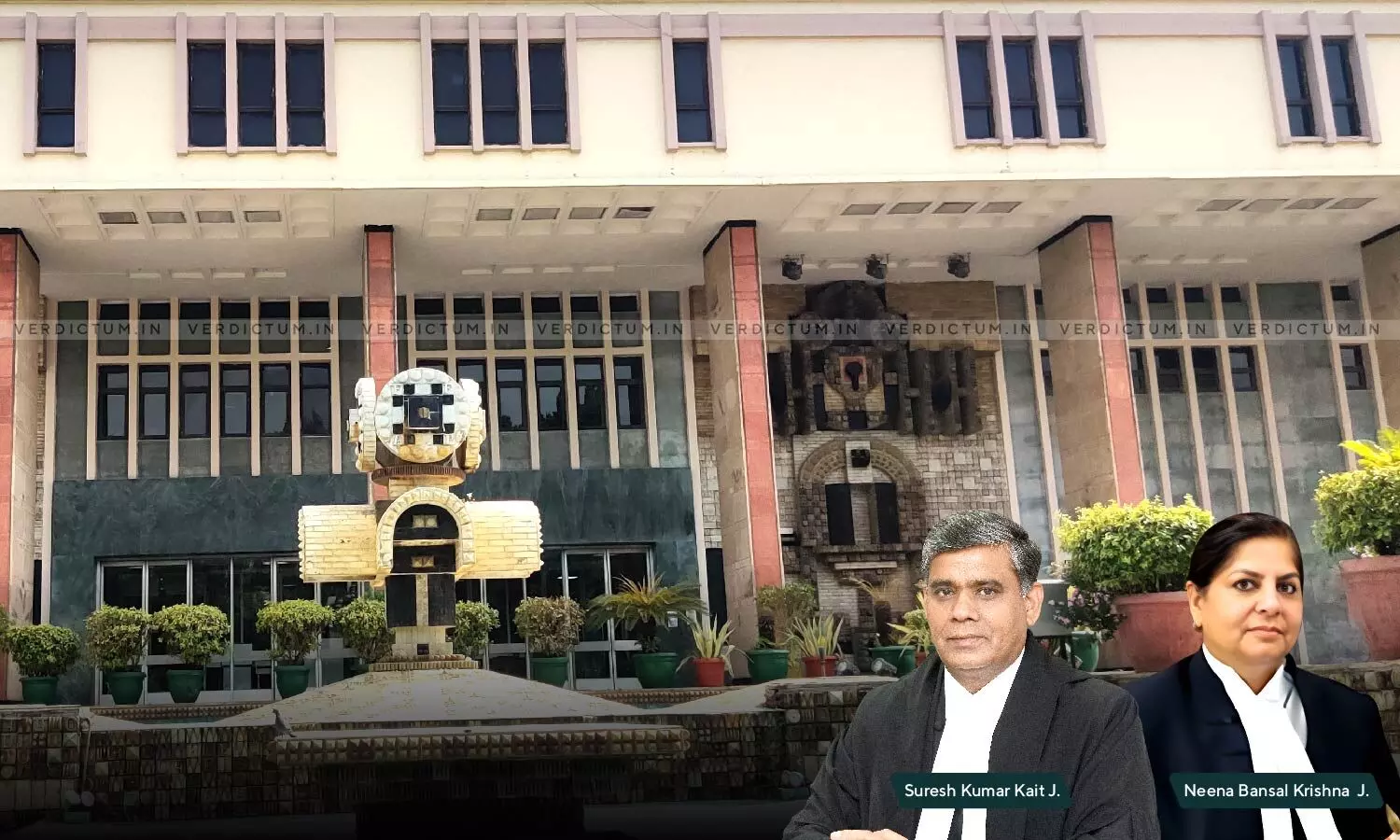
Failing To Raise Plea During Arbitral Proceedings Prohibits Raising Of New Grounds For Relief Before Appellate Authority: Delhi HC
 |
|The Delhi High Court observed that the failure to raise a plea during arbitral proceedings acts as prohibition under Section 34 of the Arbitration and Conciliation Act, 1996, preventing parties from introducing new grounds for relief before the Appellate Authority.
The Court dismissed an Appeal challenging the Commercial Court's order dismissing the appellant's objections under Section 34 against the Arbitral Award.
The Bench comprising Justice Suresh Kumar Kait and Justice Neena Bansal Krishna observed, “under Section 34 of the Act, 1996 scope of interference by the Court is limited to the extent that the Arbitral Award is not vitiated on basis of pleadings raised by the parties. The learned District Judge has rightly observed that if a party fails to raise a plea in arbitral proceedings, it cannot take a fresh ground to seek relief before the Appellate Authority and any such plea, deserves to be rejected”.
Advocate Saeed Qadr appeared for the Appellant and Advocate Navdeep Singh appeared for the Respondent.
The appeal under Section 37 of the Arbitration and Conciliation Act, 1996, challenged the Commercial Court's order dismissing the appellant's objections under Section 34 against the Arbitral Award. In the impugned judgment, the appellants were directed to pay Rs.75,00,000/- with 24% annual interest from July 15, 2018, to December 15, 2018. They were also instructed to pay Rs.1,50,000 per month from March 10, 2015, with 24% annual interest until the cancellation of the Memorandum of Understanding on July 15, 2018, along with other costs.
After the dismissal of objections under Section 34, on February 10, 2021, the Court ordered the appellants to deposit 50% of the principal amount with the Registrar General and provide an unconditional undertaking for the remaining amount pending the appeal. The Supreme Court dismissed the appellants' Special Leave Petition on March 17, 2021.
The Court noted that the dispute originated from the appellants, a company and its directors, seeking financial assistance from the respondent for a hotel project. Despite the execution of a Memorandum of Understanding, disputes arose over non-payment, leading to legal notices and arbitration. The appellants alleged forgery of the Memorandum of Understanding before the Commercial Judge, claiming a conspiracy by the respondent. However, the judge continued the proceedings, stating that arbitration had commenced and could not be terminated.
The respondent informed the Commercial Judge that Appellant No.3, Kiran Kumar Bhanot, was arrested in May 2016 at IGI Airport, New Delhi, while appellant No.2, Rakesh Kumar Bhanot, faced accusations in a 2015 CBI case. Despite directions from the High Court to surrender, appellant No.2 obtained conditional bail after multiple rejections.
The Court noted that Appellants No.2 and No.3 were involved in legal issues, including cheating cases, with proceedings pending in various courts. The respondent argued that the appellants owed money to multiple parties, engaging in numerous legal disputes, and sought dismissal of the appellants' petition for abuse of legal process.
The respondent contended that the Arbitral Award was valid, the Memorandum of Understanding (MoU) was properly executed, and registration was unnecessary. Denying the appellants' contradictory claims, the respondent highlighted payments exceeding Rs.1,25,00,000/-, refuting the appellants' assertions about the smooth running of the hotel. The respondent argued that notices were served on the appellants without a response. The Arbitrator considered payments made by the respondent, and the respondent sought the dismissal of the appellant's appeal.
Regarding the appellants' claim of the respondent being a tenant, the Court noted that the UCO bank's statement and inspection reports contradicted it. The Civil Judge dismissed the suit for Injunction, stating Parminder Pal Singh couldn't prove tenancy. The Commercial Court rightly rejected this plea.
Concerning the claim of not receiving Rs.75 Lacs mentioned in the MoU, the Bench observed that the payment time was unspecified. The Arbitrator referred to the Statement of Accounts, revealing the appellants' failure to pay, leading to the MoU's cancellation. The Commercial Court upheld the Arbitral Award, dismissing the appeal under Section 34 of the Act, 1996, finding no patent illegality in the awarded sum.
The Bench observed that Clause 13.7 of the Memorandum of Understanding (MoU) allowed the respondent to appoint a sole arbitrator. The appellants repeatedly requested a copy of the MoU to respond to the respondent's notices, but the respondent appointed the sole arbitrator instead. Despite the appellants objecting to the arbitrator's appointment, the proceedings continued.
The Bench observed that the arbitrator proceeded ex-parte when the appellants did not appear, and the impugned award was pronounced. The appellants claimed that the respondent failed to move an application for arbitrator appointment under Section 11(6) of the Act, 1996, leading them to challenge the award under Section 13(5).
The Bench emphasized that Section 11(2) allows parties to agree on the arbitrator appointment procedure. The appellants argued a violation, but the Court highlighted the limited scope of interference under Section 34. The Court reiterated that only instances of patent illegality warrant interference.
Accordingly, the Court dismissed the Appeal and affirmed the Arbitral Award.
Cause Title: Arjun Mall Retail Holdings Pvt Ltd & Ors. v Gunocen Inc. (2024:DHC:495-DB)